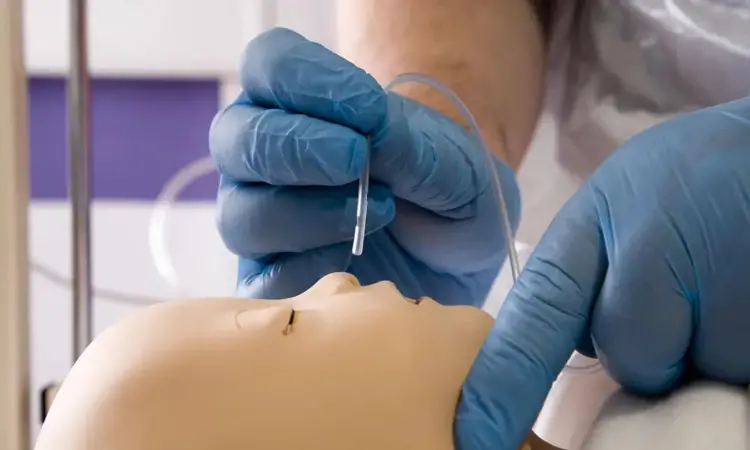- Home
- Medical news & Guidelines
- Anesthesiology
- Cardiology and CTVS
- Critical Care
- Dentistry
- Dermatology
- Diabetes and Endocrinology
- ENT
- Gastroenterology
- Medicine
- Nephrology
- Neurology
- Obstretics-Gynaecology
- Oncology
- Ophthalmology
- Orthopaedics
- Pediatrics-Neonatology
- Psychiatry
- Pulmonology
- Radiology
- Surgery
- Urology
- Laboratory Medicine
- Diet
- Nursing
- Paramedical
- Physiotherapy
- Health news
- Fact Check
- Bone Health Fact Check
- Brain Health Fact Check
- Cancer Related Fact Check
- Child Care Fact Check
- Dental and oral health fact check
- Diabetes and metabolic health fact check
- Diet and Nutrition Fact Check
- Eye and ENT Care Fact Check
- Fitness fact check
- Gut health fact check
- Heart health fact check
- Kidney health fact check
- Medical education fact check
- Men's health fact check
- Respiratory fact check
- Skin and hair care fact check
- Vaccine and Immunization fact check
- Women's health fact check
- AYUSH
- State News
- Andaman and Nicobar Islands
- Andhra Pradesh
- Arunachal Pradesh
- Assam
- Bihar
- Chandigarh
- Chattisgarh
- Dadra and Nagar Haveli
- Daman and Diu
- Delhi
- Goa
- Gujarat
- Haryana
- Himachal Pradesh
- Jammu & Kashmir
- Jharkhand
- Karnataka
- Kerala
- Ladakh
- Lakshadweep
- Madhya Pradesh
- Maharashtra
- Manipur
- Meghalaya
- Mizoram
- Nagaland
- Odisha
- Puducherry
- Punjab
- Rajasthan
- Sikkim
- Tamil Nadu
- Telangana
- Tripura
- Uttar Pradesh
- Uttrakhand
- West Bengal
- Medical Education
- Industry
Enhanced nasal suctioning not better than minimal suction for infant bronchiolitis: SNOT trial

Canada: A randomized trial has revealed mixed benefits of enhanced nasal suctioning in babies discharged from the emergency department (ED) for bronchiolitis. The findings were published in the JAMA Network Open on October 19, 2023.
"The use of an additional resource -- a composite of unscheduled revisits for bronchiolitis or additional suctioning devices used for breathing or feeding concerns -- occurred in 37.0% of the patients receiving minimal bulb suction versus 26.2% of patients receiving enhanced suction with a battery-operated device," reported researchers of the SNOT trial.
The difference was reported to be driven by greater use of additional suctioning devices in the minimal suction group (17.9% versus 6.0%), not by a discernible reduction in unscheduled ED revisits in the enhanced suction group (25.5% vs 21.9%).
The researchers noted no difference with enhanced suctioning in the number of all bronchiolitis revisits, parental care satisfaction, ED revisits, infant feeding, parental sleeping, or infant sleeping.
Bronchiolitis remains one of the most common causes of infant hospitalization, but there are limited therapeutic options outside of support. Suctioning is suggested to provide relief as the nasal congestion linked with airway infection can lead to a wide array of feeding and health issues, specifically among infants, who tend to heavily breathe through their nose.
Suzanne Schuh, University of Toronto, Toronto, Ontario, Canada, and colleagues aimed to evaluate the effectiveness of enhanced versus minimal nasal suctioning in treating infants with bronchiolitis after discharge from the emergency department in a single-blind, parallel-group, randomized clinical trial conducted from 2020 to 2022.
Participants included otherwise healthy infants (aged 1 to 11 months) with a bronchiolitis diagnosis who were discharged home from the ED. 372 participants were randomized to minimal suctioning via bulb (n=185) or enhanced suctioning (n=187) via a battery-operated device before feeding for 72 hours.
The primary outcome of the study was additional resource use, a composite of unscheduled revisits for bronchiolitis or the use of additional suctioning devices for breathing and/or feeding concerns. Secondary outcomes were feeding and sleeping adequacy, health care utilization, and satisfaction.
The researchers reported the following findings:
- Additional resource use occurred for 37.0% of minimal suction participants versus 26.2% of enhanced suction participants.
- Unscheduled revisits occurred for 25.5% of minimal suction participants versus 21.9% of enhanced suction participants.
- 17.9% of parents in the minimal suction group used additional suctioning devices vs 6.0% of parents in the enhanced suction group.
- No significant between-group differences were observed for all bronchiolitis revisits, ED revisits, parental care satisfaction, and changes from baseline to 72 hours in normal feeding, normal sleeping, or normal parental sleeping.
- Parents in the minimal suction group were less satisfied with the assigned device (33.7%) than parents in the enhanced suction group (79.2%).
"The findings showed that compared with minimal suctioning, enhanced suctioning after ED discharge with bronchiolitis did not alter the disease course as there were no group differences in feeding or revisits and sleeping adequacy," the researchers wrote.
"Minimal suctioning resulted in lower parental satisfaction with the assigned device and higher use of nonassigned suctioning devices."
Dr Kamal Kant Kohli-MBBS, DTCD- a chest specialist with more than 30 years of practice and a flair for writing clinical articles, Dr Kamal Kant Kohli joined Medical Dialogues as a Chief Editor of Medical News. Besides writing articles, as an editor, he proofreads and verifies all the medical content published on Medical Dialogues including those coming from journals, studies,medical conferences,guidelines etc. Email: drkohli@medicaldialogues.in. Contact no. 011-43720751


